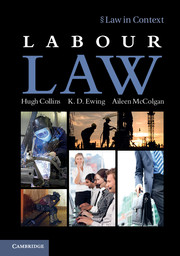Book contents
- Frontmatter
- Contents
- Preface
- Acknowledgments
- Table of cases
- Table of statutes
- Table of statutory instruments
- Table of European Union instruments
- Table of ILO instruments
- Table of other international instruments
- Abbreviations
- Part I Introduction
- Part II The contract of employment
- Part III Statutory regulation of the employment relationship
- Part IV Collective labour rights
- Part V Termination of employment
- 18 Wrongful dismissal
- 19 Unfair dismissal
- 20 Economic dismissal
- Index
- References
18 - Wrongful dismissal
from Part V - Termination of employment
- Frontmatter
- Contents
- Preface
- Acknowledgments
- Table of cases
- Table of statutes
- Table of statutory instruments
- Table of European Union instruments
- Table of ILO instruments
- Table of other international instruments
- Abbreviations
- Part I Introduction
- Part II The contract of employment
- Part III Statutory regulation of the employment relationship
- Part IV Collective labour rights
- Part V Termination of employment
- 18 Wrongful dismissal
- 19 Unfair dismissal
- 20 Economic dismissal
- Index
- References
Summary
The right to protection against unjustified dismissal
The law of dismissal plays a pivotal role in labour law. The legal rules governing the employer's power to terminate the employment relationship indirectly control the employer's disciplinary power under the contract. In order to co-ordinate production and to discourage actions that impede the objectives of the business, an employer needs the power to discipline the workforce. The most powerful sanction in support of this necessary disciplinary power is the ability to dismiss employees in circumstances where their continued employment threatens the economic success of the enterprise. Although the threat of dismissal may be carried out infrequently, its presence in the background provides employers with the necessary power to issue instructions that will normally be obeyed. In view of these efficiency considerations, the legal question that arises is not whether the employer should have the power to dismiss employees, but rather what should be the legal constraints on the procedures and substantive grounds for dismissal.
Employees desire protection from dismissal, whether the circumstances justify it or not, because the threat of dismissal impacts upon more than just their livelihood. When an employee terminates the contract by resigning from the job, the employer usually incurs costs and inconvenience. The task of finding a replacement imposes search and recruitment costs upon the employer. Training costs for the replacement employee may also be incurred. When the employer terminates the contract, however, the employee loses his or her main source of income and may forfeit long-term opportunities to augment income through work experience, seniority and promotion. In addition, insofar as work provides an opportunity to create social relations and bonds of friendship, and to establish a position of status in the community, the loss of a job can inflict psychic damage on the employee. The stakes on termination of employment are therefore usually uneven between the parties: the employer needs to incur the costs of finding and training a replacement; an employee is threatened with loss of income and risks social exclusion.
- Type
- Chapter
- Information
- Labour Law , pp. 761 - 799Publisher: Cambridge University PressPrint publication year: 2012



